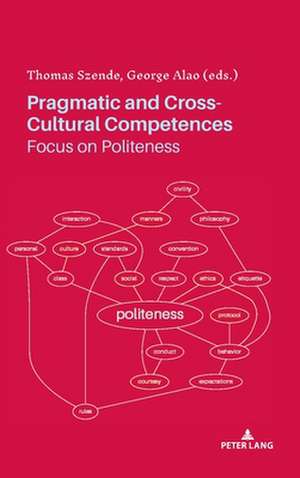Pragmatic and Cross-Cultural Competences
en Limba Engleză Hardback – 27 iun 2019
Preț: 386.64 lei
Nou
73.99€ • 76.96$ • 61.09£
Carte tipărită la comandă
Livrare economică 12-26 aprilie
Specificații
ISBN-10: 2807607470
Pagini: 290
Dimensiuni: 152 x 229 mm
Greutate: 0.48 kg
Editura: Peter Lang Copyright AG
Notă biografică
George Alao is Associate Professor of Yoru`bä, and Language and Culture Pedagogy at INALCO), where he is Deputy-Director of the research team EA 4514 PLIDAM and co-convenes its Axis 1 (Language policies, multilingualism and representations). Keenly interested in all aspects of Language Teaching and Learning including the Pedagogy of African Languages, he has authored or participated in many books including Journey into Yorùbä language and culture, EAC, 2014 and Dispositifs éducatifs en contexte mondalisé et didactique plurilingue et pluriculturelle, Peter Lang, 2014.
Cuprins
Contents: Thomas SZENDE & George ALAO: Introduction - Anthony J. LIDDICOAT & Troy McCONACHY: Meta-pragmatic awareness and agency in language learners' constructions of politeness - Peter STOCKINGER: The topos of polite behavior. Exploring thematic, narrative and discursive structures of a lexical field - Istvan KECSKES: Impoliteness as a part of pragmatic competence in L2 - Hélène DE PENANROS: When politeness is in the detail: the case of an imperative in Russian - Junji GONG & Joël BELLASSEN: Teaching fictive kinship terms in Chinese as a Foreign Language - San San HNIN TUN: Expressing politeness with discourse particles in Myanmar language - Festus A. SOYOYE: Politeness and terms of address and reference in French and YoruÌbaì - Jin-Ok KIM: Expression of politeness in Korean as a Foreign Language: diversity of linguistic means and order of acquisition - Viet Anh NGUYEN: Modelling a new approach to researching and teaching politeness in Vietnamese as an L2 - Orsolya MARÓTI: Politeness and pragmatic competence in teaching Hungarian as a Second Language: successes and pitfalls - Marijana PETROVIC: Should impoliteness be taught? - Shima MOALLEMI: L2 socialization, construction of bilingual pragmatic competence and the Persian politeness system "ta'ârof" - Festus A. SOYOYE, Tajudeen A. OSUNNIRAN & Joy C. NNABUIFE: A contrastive analysis of politeness strategies in West African Francophone and Igbo commercial interactions - Christelle HOPPE: Critical thinking, cognitive presence and social languages in an LMOOC - Elise Solange BAGAMBOULA: Politeness or buzitú ("respect") in Kikoongo (Laari)
